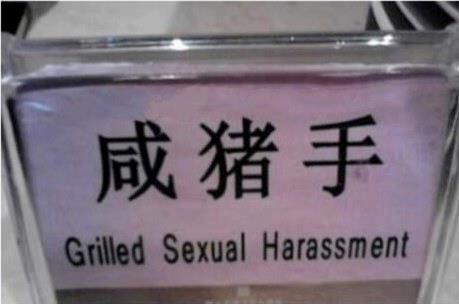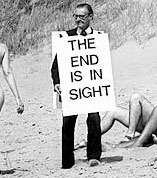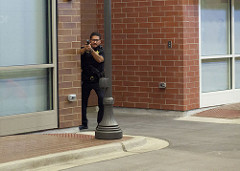Blog Archives

Photo by Don Hankins 
That being said, I’m not sure that applies to dating profiles. The article goes on:
Dating site Match asked more than 5,000 singles in the U.S. what criteria they used most in assessing dates. Beyond personal hygiene—which 96% of women valued most, as compared with 91% of men—singles said they judged a date foremost by the person’s grammar. The survey found 88% of women and 75% of men said they cared about grammar most, putting it ahead of a person’s confidence and teeth.
“When you get a message that is grammatically correct and has a voice and is put together, it is very attractive, it definitely adds hotness points,” says New Yorker Grace Gold. “People who send me text-type messages, and horrific grammatical errors? I just delete them.” She recalls the red flag raised by one potential suitor who had written his entire dating profile in lowercase. {…}
One reason people judge grammar and spelling snafus so harshly is that they can reflect the level of effort, or lack thereof, that folks put into their bio. “People use quality of writing as an indication of work ethic,” says Max Lytvyn, co-founder of automated-proofreading company Grammarly.
I think this was true of me, to a degree, when I was a part of that world. The article highlights someone who wrote an app that screens people with bad grammar and use acronyms. Depending on the dating site, you might want as many indicators as possible of a bad match. LavaLife (which was the last one I used regularly) charged you for each connection you initiate. So you wanted to make sure that each person you reached out to was worth the coin. (This probably acted as a good filter for the ladies to prevent spam-suitors and the like.) It’s a bit ironic the degree of superficiality there is in Internet dating, but because there are so many people the inclination to look at superficial criteria – especially pictures – can actually be quite strong. Grammar partially falls into that category.
That being said, if somebody had a profile that absolutely jumped out at me, but contained grammatical errors, I would probably not let that get in the way. I say grammar “partially” falls into that category because in addition to being a matter of education level it is also a matter of personal expression. Which you can glean some information off of (the same way you might be able to with the personal expression of a lip ring or a tattoo) but it’s pretty limited. I am myself rather prone to typos and the like, so I might tend towards sympathy. But if that’s you it might not be a bad idea to have someone look over it for you or something. And on a superficial level – if it’s a personal expression – it seems like a good indicator that we’re not soulmates (like a lip ring or a tattoo).
I was talking on Twitter about this with someone (the guy who wrote Thomas and the Bitter Hand) and he commented that the woman that became his wife communicated in emails with absolutely dreadful grammar and it was a good thing he didn’t take the attitude of the people in the article and all that. He was talking, though, mostly about email. Emails are less formal than a profile (which is meant to be the first impression), so some slack there. Also, grammatical errors or no emails tend to be more involved. So if there are superficial errors, it’s more likely that you’ll be able to see through that and into the person’s intelligence.
So, in summary, I’m glad I’m not single anymore.
Back home, there was a little town that had a little stretch of the Interstate that would go out during rush hour and ticket cars for driving underneath the minimum speed limit. the tickets were junk because the law also has a “reasonable and prudent” standard, but a lot of people would pay the fine just to avoid having to show up in court. It stopped at some point, though I am not sure by what mechanism it was stopped.
And with that, where better to find cars to ticket for inspection violations than a repair shop:
Bruce Redwine had seen enough. After years of watching a Fairfax County parking enforcement officer slap tickets on his customers’ cars for expired tags or inspection stickers, usually as the cars were awaiting state inspection or repair at his Chantilly shop, he snatched the latest ticket out of Officer Jacquelyn D. Hogue’s hand and added some profane commentary on top. {…}
They don’t understand why Fairfax police have zealously sought to enforce laws on expired tags or inspections, mainly on drivers who are making the effort to get their cars into compliance, while on private property. Hogue’s appearance in the industrial park often set off a scramble to hide customers’ cars inside the shops, the shop owners said.
“They’re harassing the small businesses trying to make it in this tough economy,” said Ray Barrera of A&H Equipment Repair. He estimated that his customers’ vehicles had been hit with $60,000 worth of fines and fees over the past six years.
Fairfax police said they are only on the property because of a letter issued by Mariah’s property management firm in 2009, specifically granting police permission to enforce county traffic, parking and towing ordinances.
Revenue-hungry Fairfax County is thinking about expanding the use of volunteers to write parking tickets after a five-year decline in the number of citations issued and amount of revenue collected.
The Board of Supervisors’ auditor of the board made the recommendation in a draft report that found citations had declined about 16 percent over a five-year period. Revenue fell about 5 percent despite a boost in the amount of parking fines and expanding the number of parking ordinances, the audit says.
To beef up collections, county auditors recommended that Fairfax follow other jurisdictions that have created special units of volunteers to enforce parking violations. Supervisor John W. Foust (D-Dranesville), who heads the audit committee, said he would forward the recommendations to the full board.
The worst thing of this sort to happen to me involved the former complex I lived in with my ex-roommate Karl. On New Years Day, Karl woke up to find his car missing. It seemed unlikely that someone would steal his decent but nothing-special car. He wondered if there had been some mistake, so he called the tow company on the sign in the lot and sure enough, they’d towed it. As it happened, his registration had expired with December. He asked if they were just going from car-to-car looking for expired tags. While that seemed aggravating, the truth was infuriating. No, they said, the apartment managers keep a running list and as a part of their towing contract turn over a list at the beginning of every month. As best as we could determine, the apartment complex got money from the towing company, which got money from the county.
When confronted, the apartment complex was entirely unapologetic. They basically said, “Well, you should have renewed your tags on time, shouldn’t you?”
The same is technically true of those who go to Redwin’s shop after Inspection has required. They could avoid all of this by crossing their T’s and dotting their I’s and taking care of everything on time.
The question is, though, what is the goal supposed to be here? The goal is to get people to pay for their registration and/or have their cars inspected as required by law. There are multiple ways to go about this, and consequences do have to include ticketing, fining, and at some point towing.
What the three stories have in common is belying the more powerful motivation of people trying to extract as much money as possible from people to feed the system. Whatever, system, really: Private apartment complex, private towing company, county coffers, state coffers, and individual agents whose job it is to meet their quotas management mandated goals. Which leads to some perverse incentives.
There is really no excuse to target people trying to correct their inspection situation because they are an easy target. To the extent that widespread delinquency is a problem, it makes sense to add on a general fine for late registration or inspection. I’m honestly really surprised when a state doesn’t. Back home, there is no special charge for delinquency, but whenever you do register while delinquent you are registering retroactively to prevent you from benefiting from your own lapse. Here, they don’t even do that, which is in my view excessively generous.
I don’t know what’s the case in Fairfax County and/or Virginia, and I’m honestly not sure it matters because it wouldn’t surprise me even a little bit if they got more money for delinquency and then more-more money for tickets. Fairfax County – in addition to not being a very right-wing place – has gotten a windfall from escalating property values and property taxes, but here they are. More generally, there just doesn’t seem to be much relationship between anti-tax sentiment and creative revenue-generation. I would prefer services be paid for mostly out of taxes and fair fines, of course. In part because the fines are most specifically what pays the salary of those who think its a good and fair idea to go to inspection stations to ticket people.
David Bell looks at some myths about the French Revolution. Some are more interesting than others, but #2 was the most interesting to me.
Also interesting is the degree to which contraband smuggling might have been a cause of the French Revolution.
These 14,000 images of the French Revolution make me wish I was fluent in French.
NASA says we may be needing to say our goodbyes to Louisiana and Galveston.
Jason Kuznicki writers about how modern intellectual property law makes us feudal tenants
“All major U. S. cities north of the Mason-Dixon line and east of the Mississippi have decreased in population from their peaks nearly 60 years ago.” (Except NYC and state capitals.)
Meltdown-Proof nuclear reactors? You have my attention…
Joe Carter asks why Black and Hispanic Evangelicals are more favorable to prosperity gospel.
The Dark, Haunted Joe Biden Center. “This table was just full of old alarm clocks and printed rules for the Biden Center.” I don’t know if I’d rather go there or to Dismaland.It seems that 2013 was the first year that primary care physicians brought in more net revenue to hospitals than specialists. (PDF)
It seems like eventually we’re going to have to figure out where Asians fit in to the “whiteness” of tech.
Is excessive regulation of daycare hurting women in the workplace?
Uh, oh… are we looking at Peak Wind?
Freddie Armstrong writes about Dooce’s semi-retirement and the possible end of the mommyblogger.
Anne Continetti of the Weekly Standard and Anya Kamenetz of NPR look at a new book suggesting that the US is failing its brightest kids.
This post is not about the virtues or detriments of of gun control specifically. It is more about the philosophy behind the positions. If you want to argue about gun control policy specifically, I recommend doing so in the preceding thread linked below.
Last week, in my vent about the gun control debate, Murali asked the very sensible question… what’s so wrong with gun control:
Unless you are an anarchist, you think the state is justified. Moreover, one of the basic functions that you think the state can legitimately perform is internal security. Clearly there are some ways in which the state may infringe your property (or more properly your holdings) or else the state could not even tax you to fund a police force. Clearly too, there are some measures which the state may not take (e.g. the patriot act) to ensure security. {…}
Weapons are not morally innnocent property, but belong to a type which is intended to inflict violence, something that is prima-facie illegitimate.
A weapon is a tool that is intended to inflict violence or the threat thereof. Even in defensive uses of a weapon, the weapon has defensive use only because it can threaten the aggressor with violence.
The precise justification for the existence of a state (i.e. an entity which maintains a monopoly on the legitimate use of force) is that the complete liberty to use force as and when you see fit would be horrible if everyone had it. The basic fact is that it is very nearly always an improvement of the state of affairs when this liberty is curtailed to some significant extent. Just thinking how far away we are from a Hobbesian state of nature in terms of our liberty to inflict violence on one another as and when we see fit and correspondingly how much better off we are as a result underwrites the justification for the state. That is to say, to say that the state in general (or in most cases) is justified just is to say that the delegitimisation of most private violence is justified.
My response was that I am not in favor of gun ownership as a universal right, but rather that it’s context-independent. I might well support rigorous gun control in Singapore while opposing it in the United States. There are a number of reasons for that, involving history, geography, and culture. Which Murali describes as a “pragmatic matter.”
That’s partially, but not entirely correct. I almost said as much in the thread, but Gabriel touched on it himself:
For me, I’d say it’s almost completely pragmatic. But sometimes some measures are so impracticable that to pursue them would be almost a wrong in itself. Not that there isn’t potentially a lot that can be done, like registration or coding bullets with identifying information, and perhaps requiring owners to carry liability insurance.
I also believe in something like a natural right to self-defense, which implies in my opinion the right to legal access to some of the means of self-defense. Those means don’t have to be firearms, but in a heavily armed society, I’m willing to concede that such access is part of the right.
When it comes to hunters, I don’t have a problem with them. I don’t particularly want to get in the weeds over whether they have a “right” to their firearms (leaving aside the question of the 2d amendment) or whether it’s merely sound policy to let responsible people hunt.
The middle paragraph is important. In a context where you could actually keep guns out entirely or almost entirely, and where guns are not embedded deeply into the culture, it seems highly desirable to keep them out of the hands of the people. However, once they are widely available, it’s not just impractical to try to put that cat back in the bag, it does border on the immoral. That is partly because, as Gabriel says, a general right to self-defense. But it’s also because of how troublesome it is to make harsh laws against what is culturally commonplace. Which brings me to Christopher Carr’s post Over There about Saudi Arabia’s caning an elderly man and whether or not we can call that barbaric. To which Maribou responded:
My problem with these kinds of comparisons is that “our” society is very difficult to view objectively, and so trying to compare it with another one is a tricky business.
Is it really so much better to lock people up in prison for years or decades for smoking pot?
It’s not like long prison sentences don’t carry the same kind of risks to life and limb that caning does.
(I think it’s abhorrent, what is going to happen to that man, and what happens to women in Saudi all the time. I just think our equally abhorrent things get a cultural pass, so there’s not much point in trying to valorize our own culture based on its ideals rather than its practices.)
And Dragonfrog added:
I came here to make that point.
I have seen nothing to dissuade me from holding that drug prohibition has to be considered as a whole – whether the prohibited substance is ethanol, caffeine, THC, morphine, cocaine, LSD, etc., it is either barbaric, or it isn’t. There don’t exist two categories of drugs, one of which one can non-barbarically prohibit and the other of which one cannot.
Given the above, the only question that might produce a contrast between Saudi Arabia and the US or Canada is whether caning is more or less barbaric than imprisonment or asset forfeiture.
First, I would say that “barbaric” is an awfully heavy word. And with that, even if our own failings in this regard do not approach Saudi Arabia’s, they’re close enough that it’s hard to see how the line between here and there being the line between “civilized” and “barbaric” is anything but a self-interested rationalization. If they are barbaric, then so are we. And if we are not, if we can (even while disagreeing with our own policies) see nuance, Saudis should be afforded the same generosity of nuance.
At the same time, if Dragonfrog is arguing that prohibition is an all-or-nothing deal, that we cannot view differently a society throws people in prison for dealing in lactose milk due to some religious observance and one that throws people in prison for dealing in cocaine… I can’t really agree with that. They may both be barbaric or neither be barbaric, but they’re in different points along the spectrum.
While I do not presently favor blanket decriminalization, I don’t defend the War on Drugs, or the hard hard we use in its enforcement. taking a soft hand, of course, may result in more people doing more drugs. At the very least, a War on Drugs that is never fought definitionally cannot be won. That means, among other things, accepting that people are going to die doing (many) drugs. They’re going to ruin their lives. Of course, the War on Drugs hasn’t stopped any of that. But what if it could? Or rather, what if it could make it exceedingly rare? Would you support it then? A lot of libertarians wouldn’t. I might.
The War on Drugs ruins lives. It rips children away from their parents. It sends otherwise relatively law-abiding individuals to prison. Fathers, sons, mothers, daughters. It can wreck the lives of people who would otherwise never harm anyone. To be willing to do that, you must have a degree of confidence in your success. To do otherwise isn’t just a misallocation of resources or unwise policy. It crosses the line from being merely misguided to being actively harmful dependent entirely on the context.
And that’s where I’m coming from when I talk about taking a different view on guns depending on the context. In that sense, it really is a matter of pragmatism. However, it doesn’t really stop there.
A light-handed approach would be largely ineffectual. A heavy-handed one would be actively harmful. Like the War on Drugs, it would be unsuccessful in the United States. Geography, history, and culture. And we would be left with the choice of throwing fathers, mothers, and sons into prison. Of taking children out of their homes and putting them into a foster care system that is more dangerous than a home with a gun in it. Throw in prosecutorial discretion, and you likely have selective enforcement and racist enforcement. You likely have escalating sentences to keep induce more and more compliance. Pursuit of the goal of getting rid of most guns in this country would likely require burning the village to save it. And then, not actually saving it. That may not be the goal, but I do see it as the result.
Nobody envisioned flashbombing cribs when it was decided that drugs should be illegal. We got there through an increasing desire to win The War and, perhaps most importantly, an increasing indifference to offenders. The amount of animosity towards gun owners is already immense. Gun owners injuring themselves is joke fodder or and just last week a writer at Salon said injuring them should be public policy. And in a way, it’s rational. If these people are responsible for the deaths of countless others, why should they be treated as people and not like any other criminal? Why should they be immune from jail? And on and on.
But that’s what something being illegal means. You can have intermediate steps. You can have jail as the last resort. But the more stubborn the populace, and the more justified they see themselves as being, the more people you’re going to have to take stronger measures against. That’s the question that you have to ask yourself. You have to break eggs to make an omelet. But understand the eggs, and understand the omelet. Breaking eggs to know end isn’t just impractical.
"What ho, Thomas?" cried Sir Topham Hatt. "Back from the railyard so soon?"
Wordlessly, Thomas pulled back, revealing a shadowy figure.
— ≠ (@ThomasHCrown) September 29, 2015
His wheels ground along the track as he came to a halt. He hurt so badly, he couldn't even feel his coal box. But there would be a price.
— ≠ (@ThomasHCrown) September 29, 2015
The shadowy figure lurched up slowly, haltingly, a glint of metal in his hand. Hatt peered closely, then gasped. "CYRIL! BUT YOU'RE DEAD!"
— ≠ (@ThomasHCrown) September 29, 2015
"Dead," he rasped, as if savoring both the feel and taste of the word in his mouth. "Dead. No. But not because you didn't try."
— ≠ (@ThomasHCrown) September 29, 2015
Nervously, Hatt backed up, using the panic button to summon Salty and the Dockyard Enforcers. Wheels turned unnoticed behind him.
— ≠ (@ThomasHCrown) September 29, 2015
"I'm quite sure I don't know what you mean," Hatt boomed, trying to keep steady. Just under five minutes from the docks at full steam.
— ≠ (@ThomasHCrown) September 29, 2015
"The foghorn," Cyril replied, swinging the bright steel crowbar lazily back and forth. "The goddamn foghorn AND THE LANDSLIDE OLD MAN."
— ≠ (@ThomasHCrown) September 29, 2015
He shouldn't have survived. James may not be able to haul a coal car worth a damn, but he was a professional. Hatt cleared his throat.
— ≠ (@ThomasHCrown) September 29, 2015
"We were so worried," he began. Four minutes. He could hear Salty's chant in the distance. "…and the captain yawns…"
— ≠ (@ThomasHCrown) September 29, 2015
He almost tripped over the cowcatcher behind him. Wheeling, he saw Percy's unmoving eyes drilling into his soul. "YOU," he sneered.
— ≠ (@ThomasHCrown) September 29, 2015
Percy was silent, but steam wheezed out of cracks in his top pipe. Hatt turned back to Cyril.
— ≠ (@ThomasHCrown) September 29, 2015
Still just over three minutes. He could hear Salty's insane sea shanties in the wind, but they were still too far.
— ≠ (@ThomasHCrown) September 29, 2015
"Why, we spent hours looking for you, Cyril," Hatt said, noting that the other man had stopped just short of crowbar range.
— ≠ (@ThomasHCrown) September 29, 2015
"My fathce," came the low, haunted sound from Thomas. Hatt looked more closely and saw for the first time the ruin of stillness there.
— ≠ (@ThomasHCrown) September 29, 2015
"I can't move it, OLD MAN," Thomas wheezed. "I never could. But you took even the thmile from me, jusht to inthtall a FOG HORN."
— ≠ (@ThomasHCrown) September 29, 2015
"It's NOT LIKE THAT!" Hatt cried. Under two minutes. The Dockyard Destroyer was so close. Just a bit longer. "We had no idea–"
— ≠ (@ThomasHCrown) September 29, 2015
Thomas creaked forward, the left half of his face a wreck of metal and rock. "How much wath the inthurance claim? HOW MUCH WATH YOUR THOUL?"
— ≠ (@ThomasHCrown) September 29, 2015
"Yo ho ho!" came the bloody, faux-Scottish cry. Salvation. Hatt opened his mouth to gloat when the ungodly sound of metal tearing began.
— ≠ (@ThomasHCrown) September 29, 2015
"Your friends are off to Satan's Scrapheap, HATT," Cyril growled. "JAMES is already waiting for them."
— ≠ (@ThomasHCrown) September 29, 2015
Closer. The crowbar could reach flesh now. "Do you think Edward didn't know why you sent him over the Big, Big Bridge again and again?"
— ≠ (@ThomasHCrown) September 29, 2015
Screams of absolute pain pierced the night as Edward and Gordon began using Cranky's corpse to string up the Dockyard Enforcers.
— ≠ (@ThomasHCrown) September 29, 2015
He'd known this day was coming. He'd seen the hate in Percy's eyes when he'd given the mail route to Harold.
— ≠ (@ThomasHCrown) September 29, 2015
He'd seen the pain in Thomas's eyes when Harvey met his untimely end — of love and loss and rage.
— ≠ (@ThomasHCrown) September 29, 2015
But he had an island to run. No coal-driven antiquities with frozen, cheery faces could stand in the way of that.
— ≠ (@ThomasHCrown) September 29, 2015
How to explain the end of the depreciation writeoffs, the spiraling labor costs, the fact that coal was really dirty and disgusting?
— ≠ (@ThomasHCrown) September 29, 2015
And when he'd found Cyril conspiring with Thomas to smash all the automatic foghorns? To undo all of his hard work?
— ≠ (@ThomasHCrown) September 29, 2015
There had been no going back. Nor would there be now. He still had some cards left to play in this bitter hand.
— ≠ (@ThomasHCrown) September 29, 2015
Social media and modern sensibilities: Unfriending is workplace bullying and sending too many follow requests harassment.
Credit where due: Alan Sepinwall admits when he is wrong, and a long time back he was very wrong about the prospects of a new show called CSI.
Zach Barnett argues that college football really needs to do something about the length of its games. It seems to me that keeping the clock running on first downs up to the last two minutes of each half would be a good place to start.
Kerry Howley explains the self-absorption of our response to the death of Cecil.
Lyft is going country, but Nashville is apparently especially susceptible to a robot invasion, coming to seize their jobs.
Tent cities in Tennessee: Should Nashville accept tent cities as a short-term approach to a lack of affordable housing? {via Chris}
Jack Hitt is not a fan of Paul Theroux’s new book on the South.
Utah is apparently adding a pretty significant “Doctor tax.”
Jews have gradually shifted in the public mind to being more white than not, but Gil Steinlauf wants that play called back.
The Economist reports that the “model minorities” may be losing patience.
In the UK, Mohammed Umar Farooq read a book about terrorism, which was declared a red flag that he might be a terrorist.
The Telegraphy denounces the EU as an oligarchy and says it’s time for the UK to leave.
No Offence causes offense.
Explained from the inside, how Jeremy Corbyn rocked the Labour Party.
It sucks when Americans don’t like your ethnic food and apparently when they do.
Oregon put that to rest, and in some ways the screaming seems even louder here as it was there. It was, of course, immediate. So, too, were the pre-emptive calls “not to politicize it” which I don’t disagree with but were pretty blatantly opportunistic (often accompanied by explanations for why this is why no zone needs to be a gun free zone and a sudden and disingenuous concern for mental health). I’ve past the point where I am inclined to tut-tut about politicizing it. I would prefer that we wait at least 24 hours to absorb what happened and learn what actually happened, but that’s too much to ask for.
Pro gun control people have lost all patience with the “Don’t politicize” argument, and I can actually understand where they’re coming from. As said, a lot of it is opportunistic. Just push back the talk date until the next shooting happens, then push back the talk date again, all the while talking about (or having surrogates talk about) the need for concealed and open carry. I will confess at one point my beliefs about taste and decorum may have been influenced by political self-interest. But after Newtown, I have been convinced that it is indeed an ineffective strategy and even possibly a counterproductive one for gun control advocates… and I still wish they wouldn’t do it. There may still be self-interest involved, but of the more personal self-interest of curiously not liking to be called pro-massacre and a desire after each and every tragedy not to end up in proverbial screaming matches with my friends. But as far as moving the needle is concerned, they seem destined to lose and I consider that a good thing because they deserve to lose.Being on the anti-gun control side of the argument in discussions like this is a case of trying to hit a moving target. Informed from the start that we can’t even pretend to care about this blood and death unless we are on board with their program. But when you point out that the proposed gun control measures would likely have no effect on the incident in question, you’re told that it isn’t actually about this blood and death – this blood and death that absolutely necessitates that we must argue about this before the facts are in and the bodies are cold – is not the point. It’s about shootings in general.
Except that almost none of the mass shootings that make the headlines are particularly vulnerable to gun control. They’re typically people that have their guns legally, or people capable of bypassing all but the most restrictive anti-gun laws. If moderate gun control has an effect, it’s in reducing crimes of passion, crimes of opportunity, and various shades of manslaughter caused more by recklessness than ill-intent but leaving innocent people dead all the same. And suicides. I’m not going to commit to moderate gun control having any positive effect in reducing gun crimes (though I would suicides and accidental deaths), but this is a misdirection.It’s a misdirection that seems to be born in a theory that isn’t bearing out. The idea, at some point, was that nobody will support gun control to save the lives of urban minority youths in Chicago. But if you use cases where the victims are white, then they will take notice. This seemed to almost work in the 90’s, but it’s a script that gun supporters just aren’t playing their part in. And I think that’s frustrating their opposition.
Especially frustrating to well-intentioned people on all sides is this: This is a subject on which there is very limited middle ground. If any. Especially when it comes to mass shootings. For gun control supporters, it leaves them in a position where they simultaneously assure gun rights advocates that nobody is talking about confiscation while endorsing actions abroad which involved a lot of confiscation and pointing to them as exemplars of the efficacy of gun control. For opponents, it means shrugging off changes that seem like “common sense” because they know the rallying for more gun control won’t really stop until the mass shootings do (if then) and the moderate steps won’t have much of an effect in taking down the biggest banner used by the other side.What measures will keep the guns out of the hands of these shooters that doesn’t also prevent most others from getting guns? Not just the Oregon shooter, but Newtown or Lafayette or Aurora? We could peer into their lives in search of mental illness or something, but the signs are not always obvious without hindsight and could be the sort of thing that prevents a lot of people from getting help. With theaters you could use metal detectors perhaps, if you’re willing to endure massive inconvenience for high-profile incidents that make up a relatively small proportion of deaths. Gun free zones are unlikely to have an effect on people unworried about dying or going to prison.
And you can say “It’s not about these specifically” but as long as these are a reason that we must talk about gun control, gun control needs to be connected to these events. And if you argue “Yes, gun homicides as a whole are down but mass shootings are up and so we have to take action” then the action should be related to mass shootings. If you wave the bloody shirt, you own the bloody shirt. Especially when, in my view, the increase in mass shootings is not unrelated to the publicity that they receive. So when I read arguments that pro-gun people need toThose are crappy reasons to actively oppose partial-measures that would do good on the margins. And I try not to let that influence my thinking too much. There is, however, still the case to be made that the partial-measures would actually do good on the margins, and when the arguments are often made in a bundle with allusions to other countries that have more radical measures in place and rhetoric that demands more radical measures, it’s not a winning argument to me, but those are the arguments made in the heat of the moment and tend to push me further back on to my side of the line. Not to the point that I will reflexively oppose everything, but a point where calling for “common ground” rings hollow.
Which leaves us where? The Democratic Party thinks it has found a winning issue. The Republican Party is crossing their fingers that they do with an eye towards Ohio and Pennsylvania. This is largely a replay of the 1990’s and the school shootings that seemed for a time to make it look like the issue was going to be an albatross around the GOP’s neck. Until the 2000 election approached, and the Democrats looked at the states in play and realized it wasn’t. Maybe things have changed because the NRA has overplayed its hand, or maybe not.In the interim, it takes a lot of work for me not to see the tirades of the would-be gun controllers as a form of hysteria. A view that I am not entirely comfortable with, though which I naturally find less offensive than their belief that I don’t care about dead people unless I get with their program. They ask “So you are just content to let these things happen?” Well, I wouldn’t say that, but I stipulate in their way of seeing things (I am with the program or I am not) I can see why they do. And to some extent… yes. We accept death every day. We try to minimize it where we can easily do so, but always in balance with other considerations. That can be called being pro-massacre, or being an adult.
And that, sadly, is where we are.
Dr Phi wants to know why the GOP so frequently seems to have more candidates than the Democrats:
But since 1992, it seems like the Democrat field has never been as crowded. Of the three elections since then in which the Democrats haven’t run an incumbent, the number of candidates with non-trivial delegate counts or vote totals have been:
2000: 2 (Gore, Bradley)
2004: 4 (Kerry, Edwards, Dean, and Clark (barely))
2008: 2 (Obama and Hillary)
The Republicans, in contrast, run more candidates:
1996: 5 (Dole, Buchanan, Forbes, Alexander, and Keyes
2000: 3 (Bush McCain, Keyes))
2008: 4 (McCain, Romney, Huckabee, and Paul)
2012: 4 (Romney, Santorum, Gingrich, Paul)
Which brings us to 2016. The Democrats have two declared candidates (Clinton and Sanders), one undeclared candidate (O’Malley), and one rumored to be testing the waters (Biden). Meanwhile, the Republicans have some 15 candidates serious enough to participate in one of the Fox debates.
Methodology is a bit of a question here. He uses the number of candidates with non-trivial delegate counts. That’s one way of going about it, but it’s a relatively rough measurement for how many candidates each party has. It may well be true that the Democrats weed candidates out more quickly than the GOP – or maybe not – but delegate rules differ between the parties and it excludes entirely candidates that at least in some point in the process had credibility (think Edwards in ’08) and included some with little (Alan Keyes). I also wanted to go back further than 1996.
So I looked at three different metrics: How many candidates actually announced (the GOP will have 17 by this metric)? How many were still there in Iowa and New Hampshire (so Perry and Walker would be excluded from this count)? And how many were around for the long haul? The last one was most difficult, but I defined it as getting more than 10% of the vote in any state (excluding their home state) in one of the last 25 primaries. I went all the way back to 1976, which was the second election in the primary era and the first that included competitive races for both parties.
The end result is… well, there’s just not that much difference in the parties in the longer run. Since 1996, there is, but that’s because it excludes the two elections where the Democrats smelled blood and had huge fields and no obvious candidate (1976 and 1988). Since then the GOP had large fields (ten or more announced candidates) three times (2016 is the fourth) while the Democrats haven’t. However, in terms of announced candidates the Democrats actually had eight in ’04 and ’08. But the end result going back to 1976 is that the GOP had an average of 7.1 candidates compared to 6.9 for the Democrats. The numbers don’t actually change all that much if you look at Iowa and New Hampshire or candidates in the race for the long haul. The Democrats have 5 and 2.9 respectively, compared to 4.6 and 2.6 for the GOP.
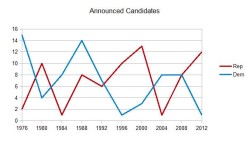 –
–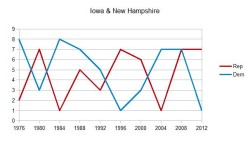
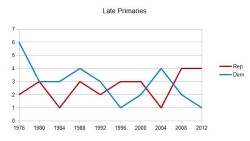 –
–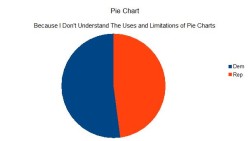
If you look at announced candidates since 1996, you do get the biggest difference of 8.8 Republicans to 4.2 Democrats. By the time we get to Iowa and New Hampshire, there’s still a difference but less of one as there are 3.8 Democrats to 5.6 Republicans. By the end of the primaries, it’s 3 to 2.
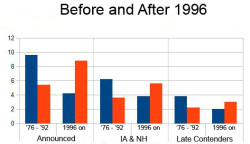 So that’s… not insignificant. To the point that it complicates the original “the parties are the same” thesis. The question is, how significant is it? Why has the tide turned? Before this year, the two largest fields were Democratic ones before ’96, but since then the Democrats haven’t hit ten once while the GOP has three times?
So that’s… not insignificant. To the point that it complicates the original “the parties are the same” thesis. The question is, how significant is it? Why has the tide turned? Before this year, the two largest fields were Democratic ones before ’96, but since then the Democrats haven’t hit ten once while the GOP has three times?
The most obvious question is whether this is merely a product of incumbency, but if that’s a factor it’s not an especially large one. Especially over the whole data set, where the GOP had two uncontested primaries (1984 and 2004) as did the Democrats (1996 and 2012). Republicans had contested incumbents in 1976 and 1992, but so did the Democrats in 1980. Broken down to before 1996 and after that does skew things a little bit, but the overall trends hold even if you entirely exclude incumbent party primaries.
One possibility is that there are just random trends and it will go back and forth. Or maybe it’s not random. A theory I can imagine gaining traction is that it coincides with the crazification of the GOP and it’s a symptom of that. If so, though, how crazy were the Democrats during the 70’s and 80’s? Maybe very crazy, if Jane’s Law (“The devotees of the party in power are smug and arrogant. The devotees of the party out of power are insane.”) has any traction. Or if we wish we can come up with a benign reason for one and a less-than-benign reason for the other.
Notably, though, most of the largest fields have come in circumstances like 2016, where one of the parties has been in office for eight years. That ties into my (very tentative theory), which is that large fields come when parties are trying to find themselves and dealing with internal conflict. In 2008 and especially 2000, despite in each case the party being out of power for eight years, there had been a consensus on which direction the party should go. The Democrats had eight candidates in 2008, but they did not represent terribly different visions of what the Democratic Party should be and was mostly a matter of who should advance that vision. In 1976, candidates ranged from George Wallace to Scoop Jackson to Jimmy Carter. It’s more complicated in 1988, but you can still see it. And in 2016, it’s very much there.
That’s just a theory, and not a hill that I am going to die on defending. And it relies on a degree of chance. The problem with the political science of presidential elections is that the sample set is always small. Sure, we are nearing sixty elections, but the facts on the ground change regularly. The parties and issues and coalitions change. With primaries in particular, there have only been eleven elections that they’ve picked the nominee, and those eleven elections have taken us all the way from Vietnam to here.
Perhaps the biggest mystery to me, to be perfectly honest, is why – with all of the senators and governors and celebrities looking for their chance to shine – we don’t have a dozen or more candidates every election.
A conversation in the football post Over There, the size of Texas came up. Said Glyph:
When I was driving cross-country, I tried to stay off Interstates as much as possible, and some long Texas highways were the only ones where I kind of got scared, like, “if my car breaks down, I could DIE out here before I ever see another human being!”
When moving across the country, it seems natural to measure progress by states. the problem with doing this is that it can make Texas a very dispiriting experience. Especially when you go the route we go.
There are two ways to get from the Southeast to the northern Mountain West. The most obvious way involves the Great Plains. It’s also the fastest way, but it’s also very, very boring (no offense, Mr Cain). On the other hand, if you go through Texas and the northeastern tip of New Mexico, you get to drive along the Front Range. The problem is this:
It’s like the route is designed to keep you in Texas as long as humanly possible. And not, sadly, the more interesting parts like the Hill Country or the Mountains in the west of the coast. It’s the flat, dry, and treeless portion.
And if you’re making your progress by state lines, can be a very long 2-3 days.
Anywhere, he’s a music video of a Robert Earl Keen song about a (proverbially) long road:
Here’s another REK video about Corpus Christi, which is not on the aforementioned route (audio only):
 Gynecological Gymnastics… from Outer Space.
Gynecological Gymnastics… from Outer Space.
A North Korean refugee wants to return to North Korea.
I do think that running for president does kinda sorta mean that you don’t get to have your name trademarked in quite the same way you did when you were a business brand.
This is a really bad idea.
Police chase, Kansas style! (It involves officers unloading on a combine being driven away by the assailant)
I thought we had a bad moving experience, but… could have been worse.
In Australia, the 11 year old totally wanted, so the 21 year old goes free.
Shell is pulling up its stakes and leaving the Alaskan Arctic.
Thanks to plenty of win and subsidies, Texas wind power producers were paying people to use their electricity.
R-Street criticizes a plan to charge solar customers for energy they’re not using. I could actually imagine it being a defensible policy, but the forces behind the policy certainly raise questions.
An East Tennessee police officer is suspended after refusing to shoot a skunk that needed to be shot (and tested for rabies).
If these policies had been in place at the outset, I’d likely still be smoking. {More}
“The phrase is ‘the death of the middle.’ We’re getting to a place where there’s going to be too much dramatic content. The best will always be bought and continue to rise in price. In the U.S., there are 62 buyers for drama. There is a lot of demand for the best, but that middle goes away or drowns. It’s the best or the cheap and cheerful.”
Scott Sumner writes of how the Chinese are apparently abandoning the city to return to the country, and how there may be no housing bubble there.
In Alternet, psychotherapist William Doherty questions his own historic assumptions and wonders if we approach divorce too selfishly.

